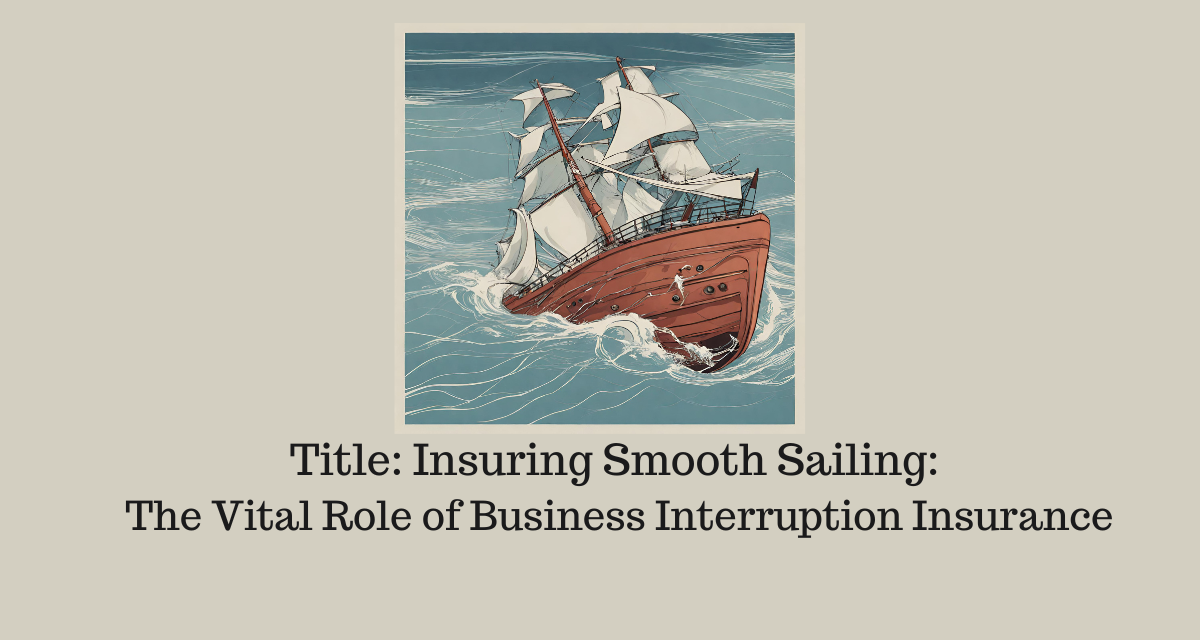Introduction:
In the world of business, disruptions can occur unexpectedly, placing operations at risk and leading to substantial financial losses. To mitigate these uncertainties, businesses turn to a valuable safeguard known as business interruption insurance. This comprehensive coverage not only cushions the blow when a calamity strikes but also helps businesses resume normal operations without enduring significant setbacks. In this article, we will explore the vital role of business interruption insurance, understanding its benefits, coverage, and how it can help businesses navigate through unforeseen challenges.
Ensuring Business Continuity: The Basics of Business Interruption Insurance
Business interruption insurance, often referred to as business income insurance, is a specialized coverage that safeguards businesses against financial losses resulting from interruptions caused by various perils. While property insurance covers the physical damage caused by disasters like fire or a natural calamity, business interruption insurance takes into account the intangible losses a business suffers when forced to cease operations temporarily.
The Key Components of Business Interruption Insurance
1. Coverage for Lost Revenue and Profits
When a business is unable to operate due to an unforeseen event, it incurs significant losses in revenue and profits. Business interruption insurance steps in to compensate for this financial shortfall, ensuring that the business does not suffer in the aftermath of a disruption. This coverage often extends to a predetermined period, such as six months or a year, allowing businesses ample time to recover and regain stability.
2. Compensation for Fixed Costs and Expenses
While revenue loss is a primary concern during a business interruption, fixed costs and expenses continue to accumulate, adding to the financial burden. Business interruption insurance considers this aspect as well, covering fixed costs like rent, utilities, and loan payments, thus alleviating the strain on businesses already grappling with the aftermath of a disruption.
3. Additional Expenses
During the recovery phase, businesses may need to incur additional expenses to get back on track. Whether it’s renting temporary office space or outsourcing critical operations, these expenses can be significant. Business interruption insurance provides coverage for such additional expenses, ensuring that businesses can make necessary investments to expedite their recovery process.
The Scope of Covered Disruptions
1. Natural Disasters
Natural disasters such as earthquakes, hurricanes, floods, or wildfires can bring businesses to a grinding halt, causing extensive property damage and forcing closures. Business interruption insurance steps in to provide financial support during these testing times, allowing businesses to rebuild, reestablish operations, and minimize the impact on their bottom line.
2. Accidental Damages
Business interruptions can also arise from accidental damages, such as a fire breakout or burst pipes causing water damage. In these situations, business interruption insurance helps cover the losses incurred during the period when the company cannot continue its regular operations.
3. Supply Chain Disruptions
In today’s interconnected business landscape, disruptions in the supply chain can have severe repercussions. A disruption in the supply chain due to a supplier’s inability to deliver goods or services can halt operations downstream. Business interruption insurance recognizes this risk and provides coverage that protects businesses from supply chain disruptions, ensuring that they can recover swiftly and maintain their commitments to customers.
4. Government Mandates or Restrictions
Government mandates or restrictions, such as temporary closure orders or evacuation orders during emergencies, can force businesses to suspend operations. Business interruption insurance covers the losses arising from such mandates, empowering businesses to bridge the financial gap and resume their operations once the restrictions are lifted.
Real-Life Illustrations: The Importance of Business Interruption Insurance
1. Case Study: The Laundromat Dilemma
Emma, a small business owner running a bustling laundromat, encountered a severe water leak that flooded her premises, rendering her facility unfit for operation. With business interruption insurance in place, Emma was not only able to cover the loss of revenue during the repair period but also manage the expenses involved in relocating temporarily. This coverage proved instrumental in minimizing the financial strain and providing the necessary support for Emma to get back on her feet swiftly.
2. Case Study: The Restaurant Revelation
Tony owned a thriving restaurant situated in a coastal town. Unfortunately, a hurricane struck, causing extensive damage to his property and making it impossible to continue serving customers. Thanks to the comprehensive business interruption insurance he had invested in, Tony was able to overcome the financial setback and rebuild his restaurant. The coverage assisted him in recovering the lost revenue, paying the necessary utilities, and retaining key employees during the rebuilding phase.
Conclusion:
Business interruption insurance is a crucial risk management tool that enables businesses to navigate uncertain times, ensuring their long-term sustainability and resilience. By providing coverage for lost revenue, fixed costs, and additional expenses, this insurance safeguards businesses from financial turmoil when the unexpected strikes. From natural disasters to supply chain disruptions, business interruption insurance acts as a safety net, allowing businesses to recover faster and continue serving their customers. So, whether you run a small enterprise or a large corporation, insuring smooth operations with business interruption insurance is a strategic decision that can make all the difference when adversity comes knocking.



